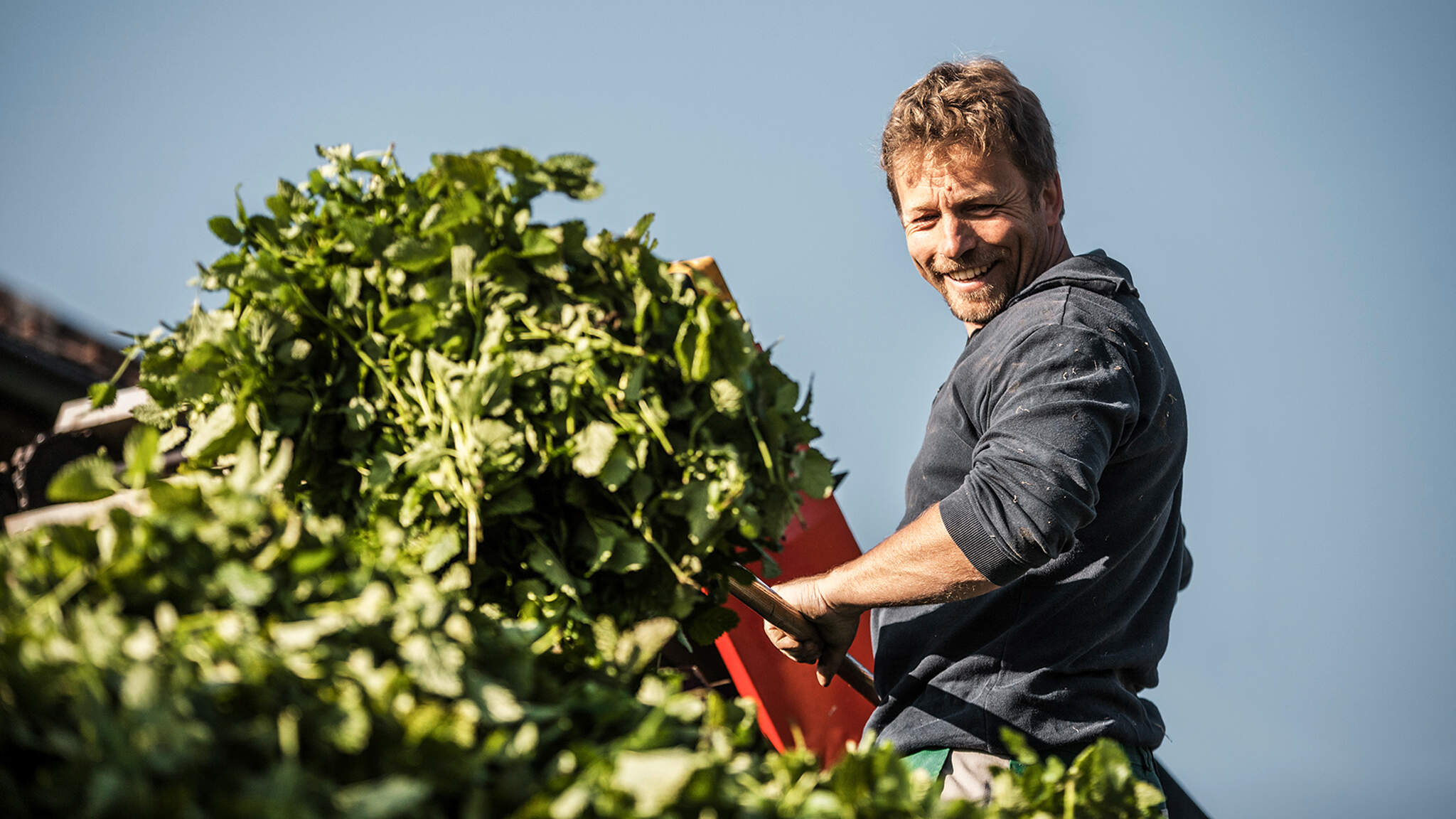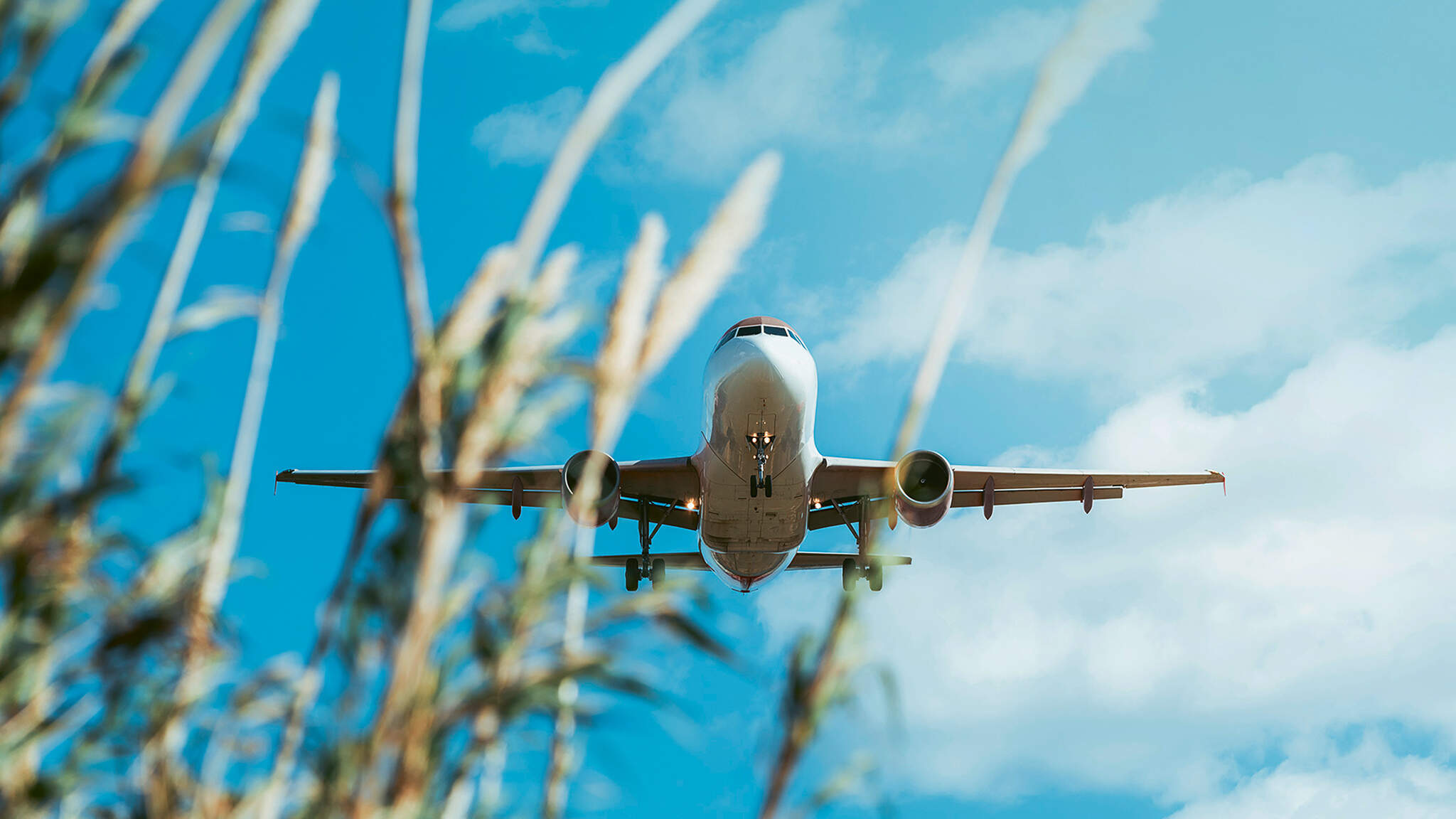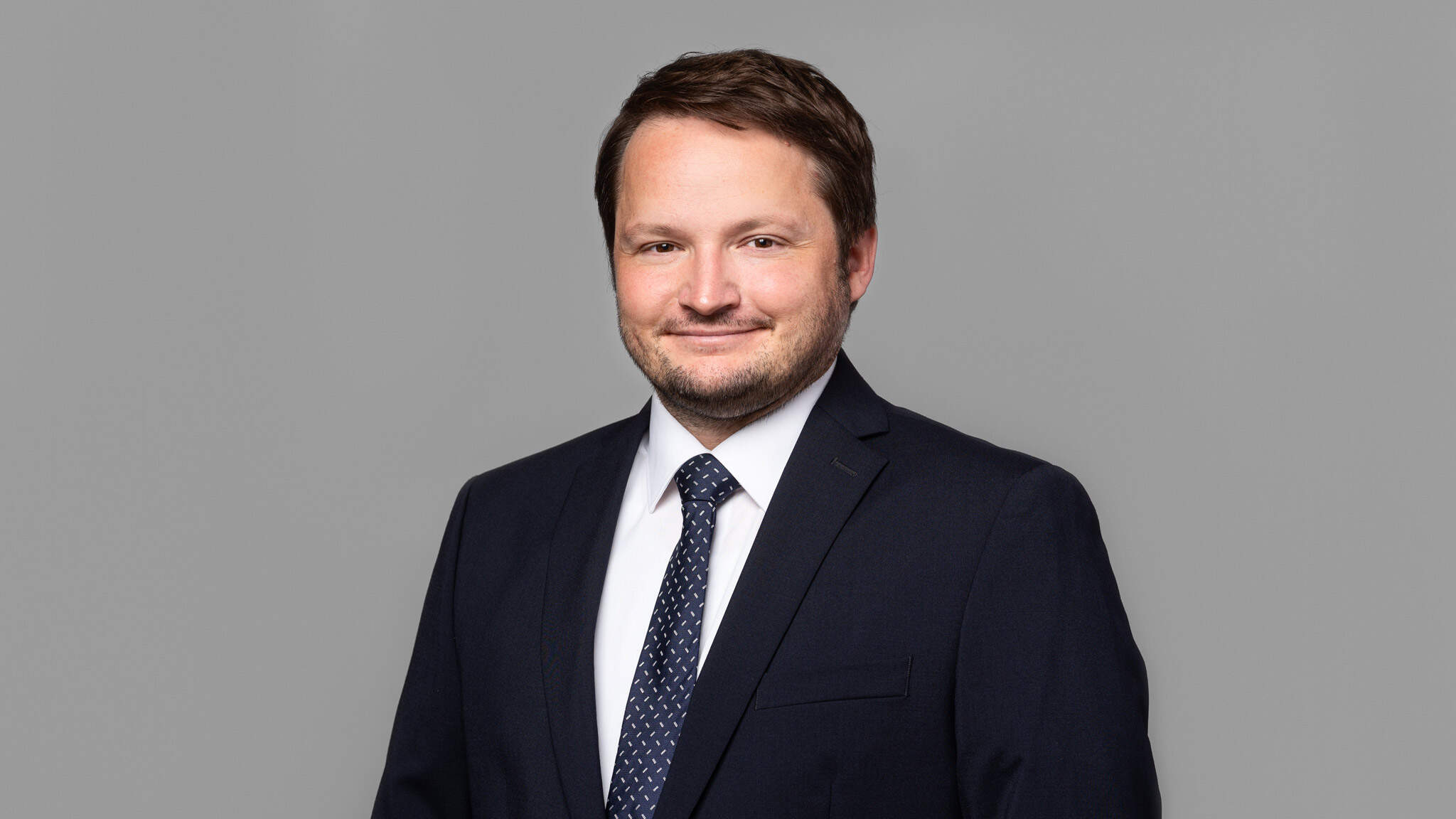The path to greater sustainability
Sustainable together: how Ricola and DACHSER are steadily reducing the Swiss herbal drop manufacturer’s CO₂ emissions all along the global supply chain. A report on values-oriented rethinking and rerouting.

Fragrant meadows, buzzing bees, a clear mountain stream, and snow-capped peaks—people in harmony with nature. This idyllic alpine world is the starting point for a story that has exceptional appeal. The main character is the Swiss herbal drop manufacturer Ricola, based in Laufen near Basel. Founded in 1930, this family- owned company is regarded as a pioneer in herb growing. It is extremely selective about its locations, and it prizes controlled ecofriendly cultivation. In this unspoiled region, Ricola has entered into fixed purchasing agreements with more than 100 growers. They supply the company with the ingredients for some 50 different products, including specialty teas, which it exports to 45 countries. Ricola currently employs around 500 people and now operates subsidiaries in Europe, Asia, and the US. In this way, the traditional Swiss company with its herbal drops has established itself as a global brand.
“If your products contain natural ingredients, your sustainability has to be compelling—from one end of the production and supply chain to the other,” says Jochen Layer, Vice President Corporate Fulfillment at Ricola. “Thinking and acting sustainably are part of how we see ourselves at Ricola. That’s why our family-owned company gives such high priority to reducing our energy consumption and our CO₂ emissions. We’re implementing a range of actions to achieve it.” This is an approach that DACHSER and Ricola shared from day one, he adds.
Since logistics accounts for a substantial share of Ricola’s total emissions, it is a particular focus of the company’s comprehensive climate protection strategy. To arrive at tangible, measurable results in this area as quickly as possible, Ricola put together a sustainability team in 2021. “We take a broad approach, one that considers not only the company’s carbon footprint, but also ethical questions relating to every link in the supply chain,” Layer says.
“At first, we thought we’d have a hard time getting logistics providers on board when it came to this rather complex topic. But when we took our climate action ideas to DACHSER, we found that we were preaching to the choir. DACHSER had long since anticipated many key aspects and even developed them further. It had compiled studies and amassed a wealth of research and project experience in other contexts, so we were immediately able to apply this vast depth of knowledge as we went about assessing and redesigning our logistics chains.”
A relationship built on trust
“Any collaboration to achieve climate goals hinges on thoroughly integrating the logistics provider into Ricola’s processes and having a working relationship that is built on trust. This is what Ricola and DACHSER have cultivated since our collaboration began back in 2008,” says Samuel Haller, Country Manager Air & Sea Logistics at DACHSER Switzerland. Together with sustainability experts from DACHSER’s Head Office in Kempten, efforts began several years ago to identify a series of different measures to reduce emissions along the entire supply chain. Jan Bender, Department Head Foreign Trade Compliance Air & Sea Logistics at DACHSER, describes the approach that became a concrete climate action pilot project with Ricola in 2022: “We examined any and all sensible levers for cutting emissions and how to adjust them.” Cecilia Homilius, Sustainability Consultant and a member of Bender’s team, explains: “The project partners were looking to establish a self-critical and unbiased decision-making process, with a focus on preferred carriers, on opportunities to use sustainable fuels—such as hydrogen and biofuels, sustainable aviation fuels (SAFs) and sustainable maritime fuels (SMFs)—and on the potential CO₂ savings these offer.” She believes that this kind of comprehensive approach is essential in implementing suitable economic and ecological measures all along the procurement and supply chains.
And that’s exactly what Ricola was aiming for when it drafted its rollout plan with the ambitious goal of halving its own CO₂ emissions from transports by 2030 compared to 2020. The goal for 2050 is net zero (well-to-wheel) greenhouse gas emissions. “At our joint kickoff workshop, we questioned and examined every aspect. We fleshed out Ricola’s expectations and targets and analyzed the supply chain to find ways of making it more sustainable. This was a hugely intensive process as well as an exciting exchange among equals,” Bender says.
“Any collaboration to achieve climate goals hinges on thoroughly integrating the logistics provider into Ricola’s processes and having a working relationship that is built on trust. This is what Ricola and DACHSER have cultivated since our collaboration began back in 2008,” says Samuel Haller, Country Manager Air & Sea Logistics at DACHSER Switzerland.
Vinh Tran, Order Management Coordinator, who is reponsible for implementing these logistics sustainability projects in operations, agrees: “We carried out a critical analysis and inventory of our emissions of CO₂ and other greenhouse gases resulting from transporting Ricola products from the factory to world markets. This yielded the first concrete measures for achieving a noticeable reduction in those emissions—across all carriers for collection, main carriage, and onward carriage.”

Scientific support
As a rule, Layer says, Ricola bases decisions to improve climate protection exclusively on proven scientific fact—as does DACHSER. For its part, Ricola calculates its carbon emissions in collaboration with myclimate, an independent, international climate protection organization with roots in Switzerland. Data collected and processed in this way shows that by 2025, Ricola will fulfill the stringent standards set out for a company of its size in the EU Corporate Sustainability Reporting Directive (CSRD). By the end of 2023, Ricola also wants to complete a B Corp certification. This is part of a holistic approach, through which the certified companies enshrine their commitment to sustainability and fair working conditions in their articles of association—further reinforcing their intentions to help create a better, more sustainable tomorrow. The goal is to ensure more transparency and values orientation, both in this area and throughout the supply chain.
Testing all transports
The latest analysis of the supply and value chains in the Swiss family-owned company’s global herbal drop logistics has already yielded a number of specific actions.
For a start, efficiency was greatly increased by improving capacity utilization and making full use of a container’s maximum payload. This led to a 12 percent reduction in the overall transportation volume requirement. “This optimization was definitely a major lever for us,” Tran says.
Next, various zero-emission drive technologies for trucks are being considered for the short-distance transport of containers from the production plant in Switzerland to the train terminal. “Unfortunately, it’s just not economically feasible for us to switch completely to purely electric alternatives,” Tran says. He adds that the company will have to wait and see how Swiss policymakers move forward as regards infrastructure and subsidies. Hydrogen-electric trucks, which many see as the future of zero-emission freight transport, are also not yet sufficiently widely available, Tran says. Until the new technologies have matured and are available for day-to-day transport operations, Ricola will be relying on biodiesel. This also saves several metric tons of greenhouse gas emissions every year.
Today, rail is the preferred means of transporting the drops from the factory to Hamburg and Rotterdam to be shipped to Asia and the US. “A 100 percent switch to rail collections instead of combined truck and barge transports saves the company approximately 51 metric tons of CO₂e per year,” Homilius says.
What’s more, the use of sustainable maritime fuels (SMFs) lowers the emissions resulting from transporting Ricola products by sea. Compared to conventional heavy oil, using SMFs can reduce CO₂e emissions by at least 75 percent in the lifecycle assessment.
For shipments to Asia (Hong Kong), Ricola and DACHSER have recently completed testing of a transport route from Laufen to the Italian port of Genoa. “Making use of ports to the south further optimizes the transport route and transport time,” Tran says. This explains why the logistics planners are now considering the potential benefit of including additional destinations in Ricola’s supply chain.

More sustainable flight
Ricola’s zeal for climate action means it also wants to further reduce its already low use of air freight. But in emergency situations, it can’t be avoided altogether. “In the course of the project, we analyzed which airline offers the most sensible direct connection and uses a modern fleet of aircraft. After all, this can make a really big difference,” Homilius says. The calculations showed, that on the main transport route from Zurich to New York, there was a massive difference between the best and worst combination in terms of lifecycle footprint: 500 g and up to 1,200 g of CO₂e per ton kilometer. DACHSER now also enables Ricola to use sustainable aviation fuels (SAFs), which saved over 150 metric tons of CO₂e in the first half of 2023 alone.
“We’re not trying to save the world by ourselves. But we can and want to do our part to help make the world a better place,” Layer says. At Ricola, this mindset has really struck a chord that goes beyond the innovation projects with DACHSER, most recently with an ideas competition for trainees. “Our trainees really ran with it and showed terrific enthusiasm.” The 35 sustainability ideas submitted have so far spawned four projects focusing on wind power, sustainable packaging, food waste prevention, and more efficient purchasing.
For Layer, both the ideas competition and the collaboration with DACHSER carry a message of future potential: “We see how making even a few adjustments lets us achieve great things. This makes us keen to do even more, and we will.” Here’s hoping that the image of the unspoiled alpine world continues to have such positive appeal.
